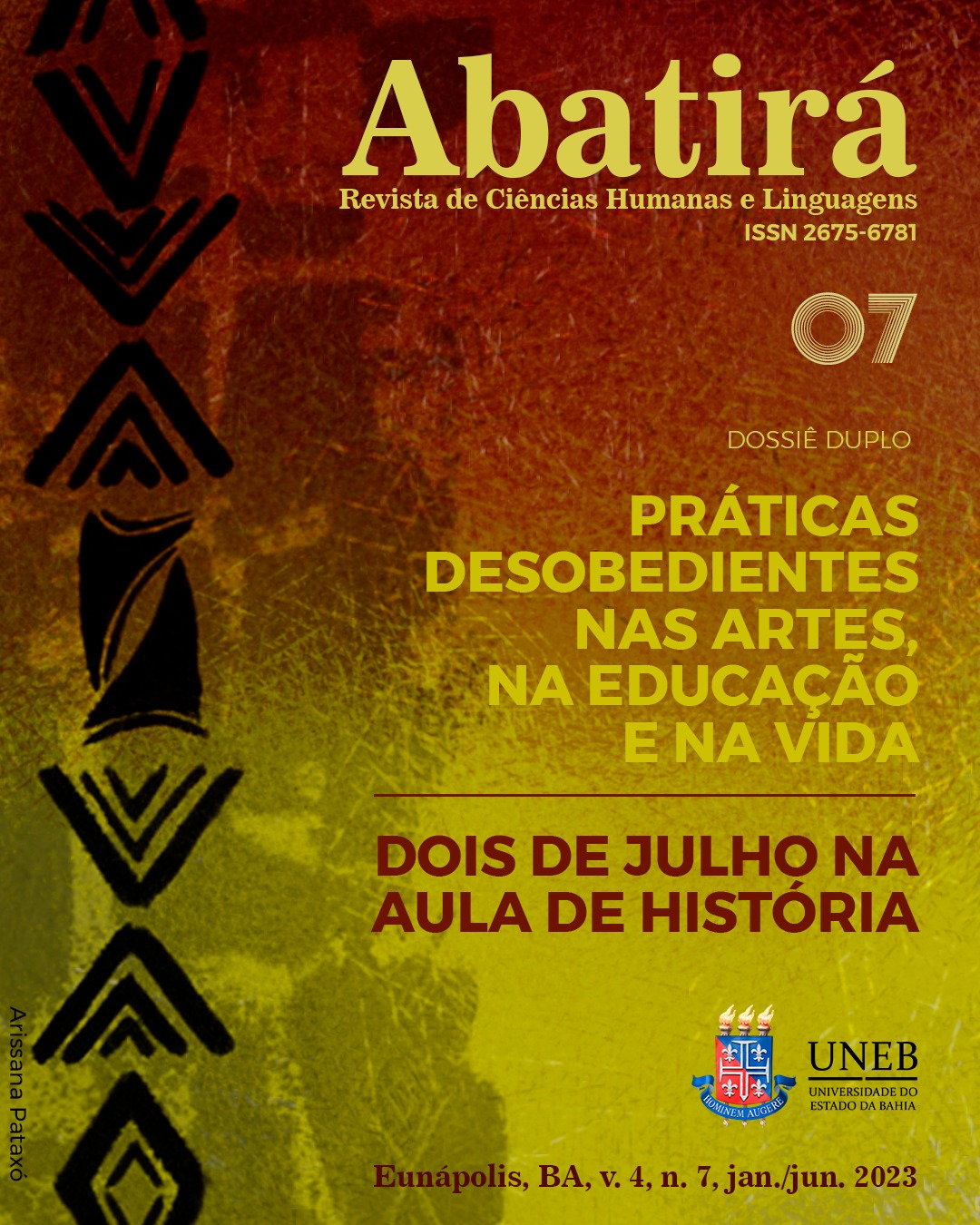“The Wave”
Cinema, authoritarianism, and transformation
Keywords:
Classroom; Role of the teacher; MovieAbstract
This work had the objective of discussing the film “The Wave” as a promising way to debate the authoritative waves in the field of education, in light of the contributions of Paulo Freire, also dialoguing with the reflections of Gaston Bachelard about the scientific spirit, of Deleuze and Guattari related to art as a power of thought and still by Alain Bergala on "fragment pedagogy" for the reading of cinematographic images. The film “The Wave” presents two versions for the cinema (1981 and 2008) and its current status and relevance sustain, above all, the times in which we live. The narrative is based on real facts, in which a professor in the United States has worked with autocracy with students at Middle School in the last two years of the past century, a time of several questions about social inequalities. “The Wave” raises many possibilities for debates that are also interesting, concerning both the role model of the teacher and the pression of the social group. In any case, the authoritarian waves in education and the possibility of transformation are of particular relevance to adolescents, a public that has worked in the classroom in the film. This is, a crucial period, in the formation of identities, debate which is the most urgent and relevant in recent times.
Downloads
References
APPLE, Michael. Ideologia e currículo. Porto Alegre: Artmed. 2006.
ARIÈS, Philippe. História Social da Criança e da Família. Tradução de Dora Flaksman. 2a ed. Rio de Janeiro, Zahar, 1981.
COCKERMAN, William C. Medical sociology. 5th ed. New Jersey: Prentice-Hall, 1992.
BACHELARD, Gaston. A formação do espírito científico: contribuição para uma psicanálise do conhecimento. Rio de Janeiro: Contraponto, 1996.
BERGALA, Alain. A hipótese-cinema: pequeno tratado de transmissão do cinema dentro e fora da escola. Rio de Janeiro: Booklink - CINEAD-LISE-FE/UFRJ, 2008.
BERTI, Andreza Oliveira. Reflexões pedagógicas sobre o cinema. Educ. PUC. Campinas, v. 20, n.1, p.41-49, 2015.
BONDÍA, Jorge Larrosa. Notas sobre a experiência e o saber de experiência. Revista Brasileira de Educação, n. 19, p 20-28, 2002, Associação Nacional de Pós-Graduação e Pesquisa em Educação. Rio de Janeiro, Brasil.
CAMBI, Franco. Intercultura: fondamenti pedagogici. Roma: Carocci, 2001.
CAMPESATO, Lília. Discursos e ideologias do ‘experimentalismo’ na música do pós-guerra. Revista Poiésis, v.16, n. 25, p. 43-64, 2015.
CUNHA, Marcus Vinicius da. Psicologia da Educação. Rio de Janeiro: DP&A, 2000.
DUSI, P. Flussi migratori e problematiche di vita sociale. Verso una pedagogia dell’ intercultura. Milano: Vita e Pensiero. 2000.
FREIRE, Paulo. Educação e mudança. Rio de Janeiro: Paz e Terra. 1986.
FREIRE, Paulo. A pedagogia do oprimido. Rio de Janeiro: Paz e Terra. 1987.
MACHADO, Roberto. Deleuze, a arte e a filosofia. Rio de Janeiro: Zahar, 2009.
DEZIN, Norman K. A note on Emotionality, Self and Interaction. American Journal of Sociology, v.89, n. 2, p.402-409. 1983.
DURKHEIM, Emile. The division of labor in society. The Free Press, 1984.
FISHER, Gene. A.; CHON, Kyum Koo. Durkheim and the social construction of emotions. Social Psychology Quarterly, v. 52, n.1, p. 1-9. 1989.
FOUCAULT, Michel. 2001. Vigiar e Punir. Petrópolis: Vozes.
KEMPER, Theodore D. Social Constructionist and Positivist Approaches to the Sociology of Emotions. American Journal of Sociology, v. 87, n.2, p. 336-362. 1981.
LISPECTOR, Clarice. A descoberta do mundo. Rio de Janeiro: Rocco. 1999.
PASTORIZA, Bruno dos Santos e DEL PINO, José Cláudio. Para falar de disciplina, corpos e conhecimentos – Entre os Muros da Escola. Revista Eletrônica de Educação, v.9, n.1, p.301-317, 2015.
SCHEFF, Thomas J. Toward integration the social psychology of emotions. Annu. Rev. Sociol., v. 9, p. 333-354. 1983.
SILVA, Tomaz Tadeu da. Documentos de identidade. Uma introdução às teorias do currículo. Belo Horizonte: Autêntica, 2007.
THOITS, Peggy A. The Sociology of Emotions. Annual Review of Sociology, v.15, p.317-342. 1989.
THRIFT, Nigel. Intensities of feelings: towards a spatial politics of affect. Geografiska Annaler, 86 B, p. 57-78. 2004.
VON SCHEVE, Christian; VON LUEDE, Rolf. Emotion and Social Structures: Towards an Interdisciplinary Approach. Journal for the Theory of Social Behaviour, v. 35, n.3, p. 303-328, 2005.
WOOD, Nichola; WAITE, Louise. Editorial: scales of blonging. Emotion, Space and Society, v. 4, p. 201-202, 2011.
Downloads
Published
How to Cite
Issue
Section
License
Copyright (c) 2023 Isabela Cabral Félix de Sousa, Ana Lucia de Almeida Soutto Mayor

This work is licensed under a Creative Commons Attribution 4.0 International License.

Este trabalho está licenciado sob uma licença Creative Commons Attribution 4.0 International License.Você é livre para:
Compartilhar - copia e redistribui o material em qualquer meio ou formato; Adapte - remixe, transforme e construa a partir do material para qualquer propósito, mesmo comercialmente. Esta licença é aceitável para Obras Culturais Livres. O licenciante não pode revogar essas liberdades, desde que você siga os termos da licença.
Sob os seguintes termos:
Atribuição - você deve dar o crédito apropriado, fornecer um link para a licença e indicar se alguma alteração foi feita. Você pode fazer isso de qualquer maneira razoável, mas não de uma forma que sugira que você ou seu uso seja aprovado pelo licenciante.
Não há restrições adicionais - Você não pode aplicar termos legais ou medidas tecnológicas que restrinjam legalmente outros para fazer qualquer uso permitido pela licença.





